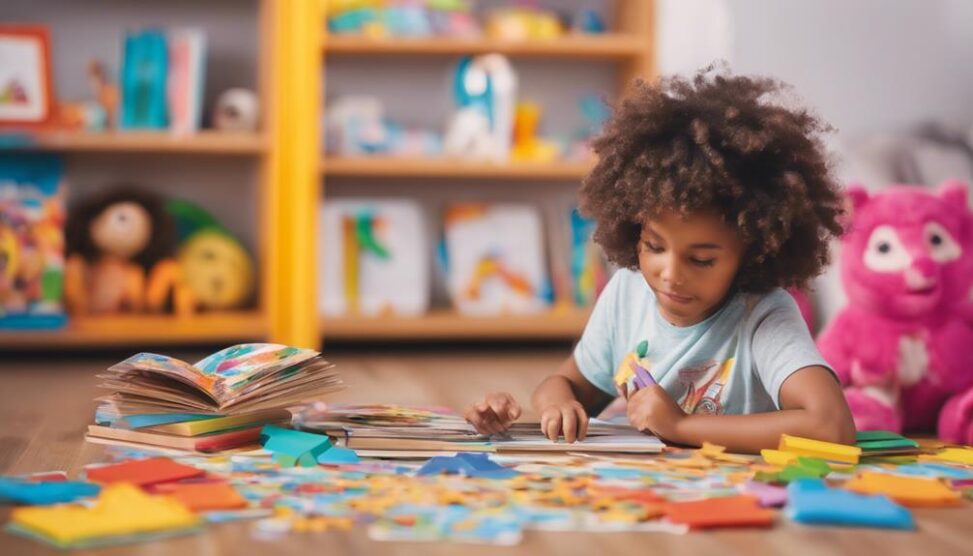Are you looking to provide your young learners with engaging and educational activities? Activity books can be a valuable tool in their development, but with so many options available, how do you choose the best ones?
Understanding the benefits of activity books and how they can support early learning is essential. From fostering creativity to enhancing fine motor skills, each activity serves a purpose in your child's growth.
Stay tuned to learn more about how these books can offer a holistic approach to education for your little ones.
Key Takeaways
- Activity books enhance cognitive development and problem-solving skills.
- They foster creativity, concentration, and fine motor skills.
- Choose age-appropriate, engaging books to boost learning.
- Utilize activities to improve language skills, attention span, and memory.
Benefits of Activity Books
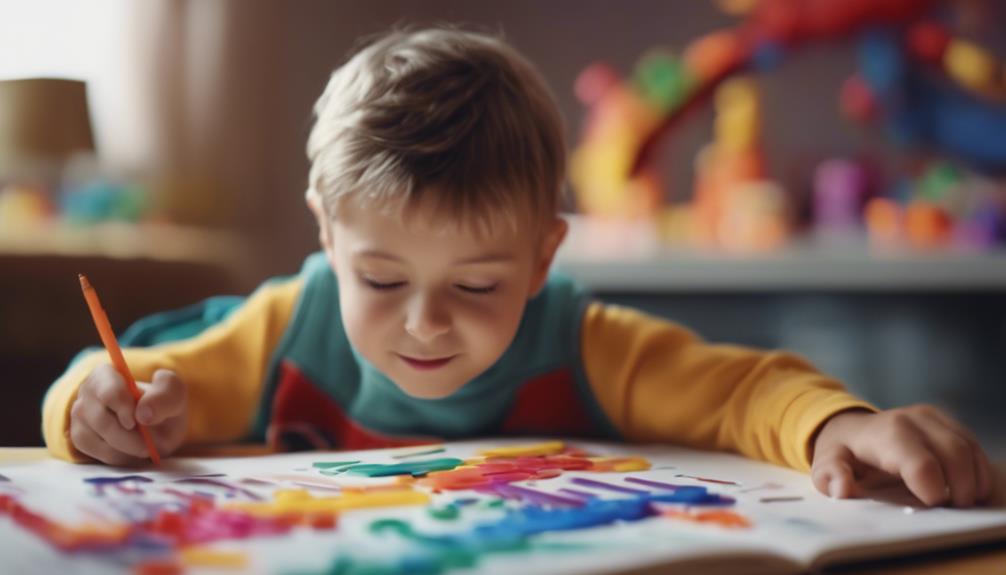
Activity books offer a multitude of benefits for young learners, making them an engaging and effective educational tool. These books can significantly improve focus by providing structured activities that require attention to detail. As you complete puzzles, color pictures, or connect dots, your concentration naturally strengthens.
Moreover, activity books are fantastic for fostering imagination. They often include creative tasks that encourage you to think outside the box, visualize different scenarios, and come up with unique solutions. By engaging in these activities, you not only enhance your artistic skills but also expand your creativity and innovative thinking.
When you delve into an activity book, you enter a world where your focus sharpens, and your imagination runs wild. These books offer a perfect balance of challenge and fun, keeping you entertained while stimulating your cognitive abilities. So, next time you pick up an activity book, get ready to boost your focus and unleash your imagination like never before!
🌊 Discover Endless Fun with Beachcomber Press Puzzle Books! 🌊
Elevate your puzzle game with our captivating collection on Amazon.
Perfect for all ages, our books are packed with unique
challenges that promise hours of entertainment.
Diverse puzzles for every skill level High-quality, engaging content
Choosing the Right Book
To make the most of your learning experience, consider your interests and learning goals when selecting an activity book. When choosing the right book for early learners, focus on age-appropriate selection and engaging content. Look for activity books that align with the child's age and developmental stage to ensure the activities are neither too simple nor too complex. Engaging content is crucial to keep the child interested and motivated to complete the activities.
Opt for activity books that cover a variety of topics to cater to different interests and learning styles. Whether your child enjoys puzzles, coloring, or educational games, there are activity books available to suit their preferences. Additionally, consider interactive activity books that involve hands-on tasks to enhance learning and retention.
Importance of Creativity

Fostering creativity in early learners through engaging activities enhances their cognitive development and problem-solving skills. Creative expression and imaginative play are vital components of a child's growth. Activity books that encourage artistic exploration and innovative thinking help children develop essential skills that will benefit them throughout their lives.
By engaging in activities that promote creative expression, children learn to think outside the box, explore new ideas, and express themselves in unique ways. Imaginative play allows them to develop storytelling skills, enhance their communication abilities, and build self-confidence. These aspects are crucial for their overall development and will serve them well in academic and social settings.
Artistic exploration through activities like drawing, coloring, and crafting not only nurtures creativity but also improves fine motor skills and hand-eye coordination. Furthermore, encouraging innovative thinking from a young age fosters a mindset of curiosity and problem-solving, setting a strong foundation for future learning and success. Embracing creativity in early learners is key to unlocking their full potential and preparing them for a bright future.
Enhancing Fine Motor Skills
Exploring creativity through artistic activities not only nurtures a child's imagination but also plays a crucial role in enhancing their fine motor skills. Engaging in activities that involve finger exercises and hand-eye coordination can significantly improve a child's dexterity and coordination.
Here are three ways these activities can help enhance fine motor skills:
- Precision and Control: By practicing activities like drawing shapes, cutting along lines, or tracing letters, children can improve their precision and control over their hand movements.
- Grip Strength: Engaging in tasks that require squeezing, pinching, or manipulating small objects can help strengthen the muscles in the hand and fingers, enhancing grip strength.
- Hand-Eye Coordination: Activities that involve coordinating hand movements with visual stimuli, such as threading beads, connecting dots, or coloring within lines, can enhance hand-eye coordination, improving overall motor skills.
Encouraging these activities not only fosters creativity but also lays a strong foundation for developing essential fine motor skills in early learners.
Learning Through Play
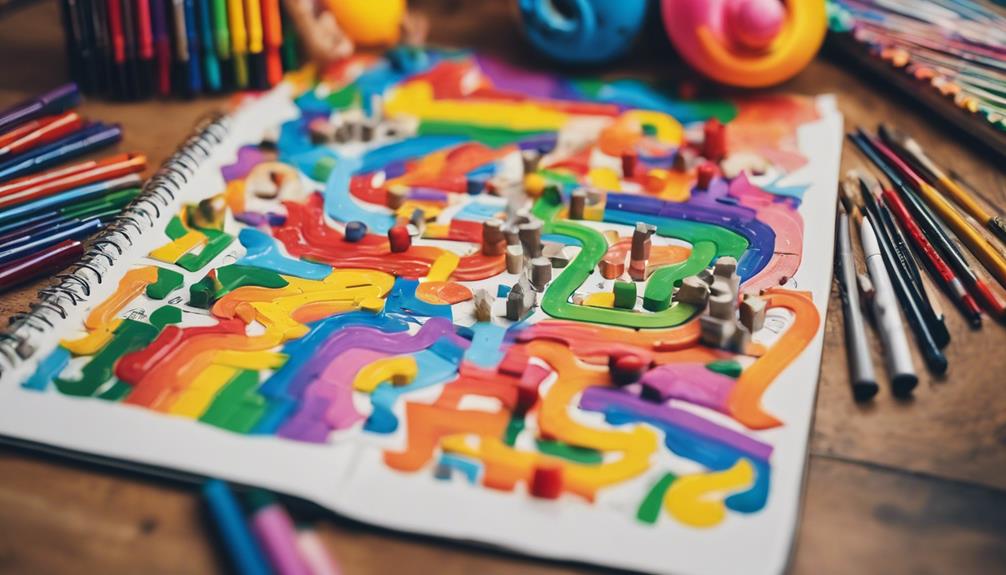
Engage young minds through interactive play experiences that cultivate a love for learning and discovery. Play-based education is a powerful tool for early learners, offering hands-on learning opportunities that spark creativity and critical thinking skills. By incorporating play into educational activities, children can explore, experiment, and problem-solve in a fun and engaging way.
Hands-on learning is essential for young children as it allows them to actively participate in their own education. Activity books that focus on learning through play provide a dynamic environment where kids can develop cognitive abilities while having fun. These interactive experiences not only enhance academic skills but also foster social and emotional growth.
Through play-based education, children can explore various concepts such as colors, shapes, numbers, and letters in a way that feels like play rather than work. This approach creates a positive association with learning, helping children develop a lifelong love for exploration and discovery. Embrace the power of play to ignite a passion for learning in young minds.
Exploring Different Themes
Discover new worlds and spark creativity with activity books that delve into a variety of themes for early learners. These books open doors to exciting adventures, allowing you to explore different worlds right from the comfort of your own home.
- Nature Exploration: Dive into the wonders of the natural world through activities that focus on plants, animals, and ecosystems. Learn about the importance of conservation and sustainability while having fun coloring, drawing, or completing nature-themed puzzles.
- Animal Adventures: Embark on thrilling journeys filled with fascinating creatures from all corners of the globe. From the depths of the ocean to the heights of the mountains, these activity books will introduce you to a wide array of animals and their habitats, teaching you valuable lessons about wildlife conservation.
- Fantasy Realms: Step into magical realms where dragons soar the skies and unicorns roam enchanted forests. Let your imagination run wild as you engage in fantastical activities that transport you to realms beyond your wildest dreams.
Cognitive Development Activities
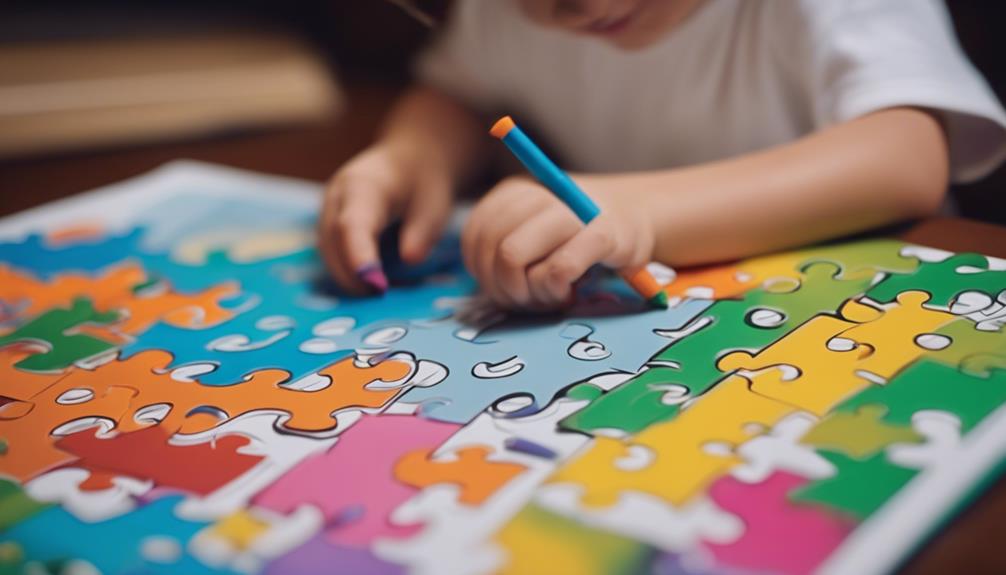
Dive into stimulating activities that challenge your mind and enhance cognitive development in early learners. Activity books designed to boost cognitive skills focus on problem-solving and critical thinking. These activities aren't only engaging but also play a crucial role in shaping young minds.
Engaging in problem-solving tasks helps children develop essential skills such as logical reasoning and analytical thinking. Activities that require critical thinking encourage kids to evaluate information, make decisions, and draw conclusions. By tackling puzzles and challenges, children learn to approach problems methodically and think creatively.
🌊 Discover Endless Fun with Beachcomber Press Puzzle Books! 🌊
Elevate your puzzle game with our captivating collection on Amazon.
Perfect for all ages, our books are packed with unique
challenges that promise hours of entertainment.
Diverse puzzles for every skill level High-quality, engaging content
Through cognitive development activities, young learners enhance their ability to solve complex problems independently. These tasks promote a deeper understanding of concepts and improve memory retention. As children progress through these activities, they become more adept at analyzing situations, identifying patterns, and making connections.
Incorporating problem-solving and critical thinking activities into early learning sets a strong foundation for academic success and lifelong cognitive development. Encourage your child to explore these activities to foster a sharp and agile mind.
Interactive Puzzles and Games
Enhance your early learner's cognitive skills and problem-solving abilities through interactive puzzles and games designed to stimulate critical thinking and creativity. Engaging in hands-on learning with problem-solving activities can be incredibly beneficial for your child's development.
Here are some ways interactive puzzles and games can make a difference:
- Encouraging Critical Thinking: Interactive challenges present opportunities for your child to think critically, analyze information, and come up with innovative solutions.
- Fostering Creativity: By engaging in interactive puzzles and games, children can explore different approaches to problem-solving, sparking their creativity and imagination.
- Building Resilience: Facing challenges in games can teach resilience and perseverance, important qualities that can help children overcome obstacles in various aspects of life.
Boosting Language Skills
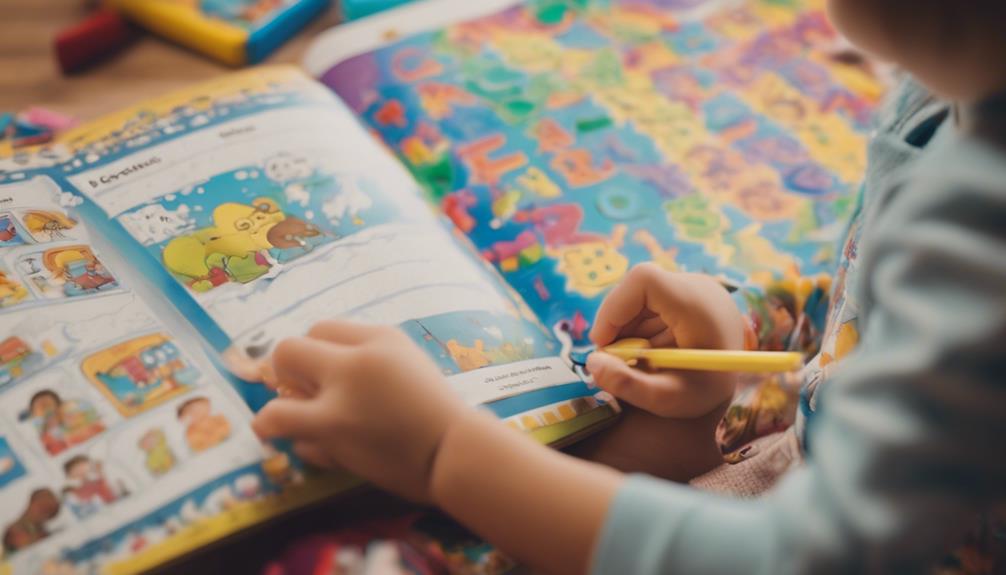
To bolster your child's language skills, consider incorporating engaging activities and resources that promote literacy development from an early age. By focusing on vocabulary building and interactive exercises, you can create a fun and effective learning environment. Storytelling prompts are also a fantastic way to enhance language development, sparking creativity and improving communication skills. Here is a table showcasing some engaging activities to boost language skills:
| Activity | Description | Benefits |
|---|---|---|
| Word Scavenger Hunt | Search for specific words in books or at home | Enhances vocabulary and critical thinking skills |
| Storytelling Dice | Roll dice to create unique story prompts | Encourages creativity and language fluency |
| Alphabet Matching Game | Match letters with corresponding objects | Improves letter recognition and language skills |
Incorporating these activities into your child's routine can make learning language skills enjoyable and rewarding. By engaging in these interactive exercises and storytelling prompts, your child's language abilities are sure to flourish.
Developing Concentration
Boost your child's ability to focus and concentrate by introducing engaging activities designed to boost their attention span and cognitive skills. To help your child develop better concentration, consider the following techniques:
- Focus Techniques: Encourage your child to practice focusing by setting short time intervals for specific tasks. This can help them learn to concentrate for longer periods gradually.
- Mindfulness Exercises: Introduce mindfulness exercises like deep breathing or simple meditation techniques. These practices can help improve attention span and reduce distractions.
- Memory Games: Engage your child in memory-boosting games such as matching pairs or memory card games. These activities not only enhance concentration but also improve cognitive functions like memory retention.
Encouraging Independent Exploration
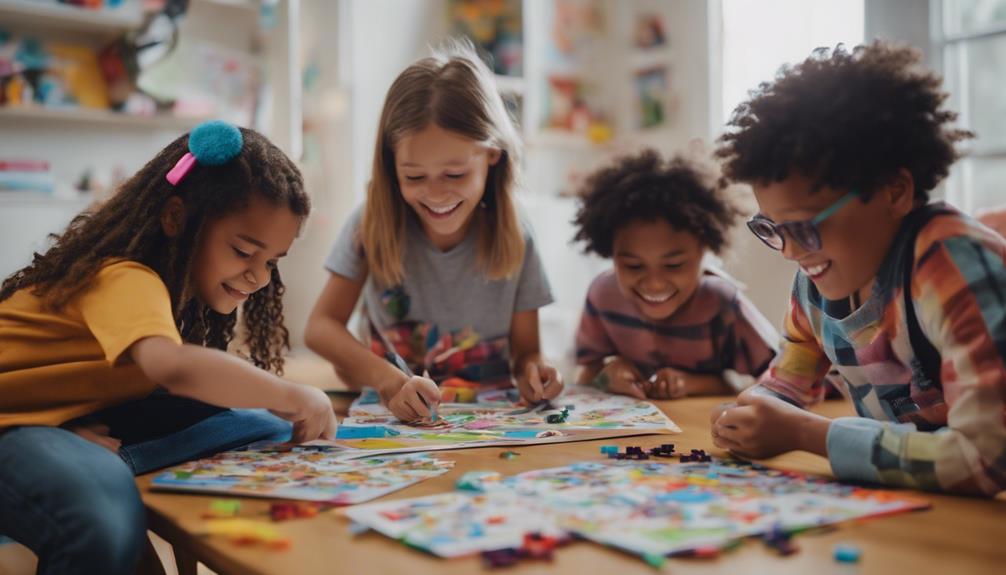
Encourage your child to explore independently by providing them with a variety of open-ended activities that spark curiosity and creativity. Hands-on activities are a fantastic way to engage your child's senses and promote active learning. Consider activities like building blocks, sensory bins, or nature scavenger hunts to foster exploration and discovery. These types of activities not only entertain but also educate, encouraging your child to think critically and problem-solve.
Creative exploration is another key component in promoting independent learning. Offer your child materials like crayons, paints, clay, or even recycled items to spark their imagination and artistic expression. Encourage them to create without boundaries, allowing their ideas to flow freely.
Sharing the Joy of Learning
Share in the excitement of learning with your child by exploring new activities together that spark curiosity and foster a love for discovery. Engaging in educational activities not only helps your child learn but also strengthens the bond between you.
Here are some ways to enhance the joy of learning with your child:
🌊 Discover Endless Fun with Beachcomber Press Puzzle Books! 🌊
Elevate your puzzle game with our captivating collection on Amazon.
Perfect for all ages, our books are packed with unique
challenges that promise hours of entertainment.
Diverse puzzles for every skill level High-quality, engaging content
- Fostering Curiosity: Encourage your child to ask questions and explore new ideas. Curiosity is the key to a lifelong love of learning.
- Building Confidence: Praise your child's efforts and celebrate their progress. Building confidence in their abilities will motivate them to tackle new challenges.
- Sparking Imagination: Engage in imaginative activities that encourage creative thinking. This will help your child develop problem-solving skills and think outside the box.
Frequently Asked Questions
Can Activity Books Be Used as a Tool for Addressing Specific Learning Challenges or Disabilities in Young Children?
Activity books can be valuable tools for addressing learning challenges or disabilities in young children. By providing individualized strategies and accommodations, these books can support children in developing skills and overcoming obstacles in an engaging way.
Are There Any Recommended Age-Appropriate Guidelines for Introducing Different Types of Activity Books to Early Learners?
Dive into the sea of activity books, matching the waves of learning with age-appropriate recommendations. Sail smoothly by introducing various types thoughtfully, considering how to navigate learning challenges and disabilities effectively as you set sail on this educational journey.
How Can Parents and Educators Ensure That Children Are Not Getting Overwhelmed or Frustrated With the Activities in the Books?
To ensure children don't get overwhelmed with activities, involve yourself in their book time. Offer encouragement and praise their efforts. Guide them when needed but also let them explore independently. Positive reinforcement and gentle guidance go a long way.
Are There Any Tips for Adapting Activities in the Books to Better Suit Individual Learning Styles or Preferences of Children?
Feeling stuck with activities in the books? No worries! You can adapt them to fit your child's learning style or preferences. Try different strategies like visual aids, hands-on tasks, or collaborative projects for a customized learning experience.
How Can Activity Books Be Integrated Into a Daily Routine to Maximize Their Educational Benefits for Early Learners?
To maximize educational benefits for early learners, integrate activity books into your daily routine. Encourage creative play and sensory exploration by dedicating specific times for interactive activities. Make learning fun and engaging while nurturing your child's development.
Conclusion
You've now learned all about the benefits of activity books for early learners.
Did you know that studies show that children who engage in hands-on activities like those found in activity books develop better problem-solving skills and critical thinking abilities?
So, next time you're looking for a fun and educational way to keep your little one entertained, reach for an activity book and watch them thrive!
